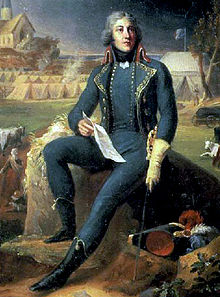Louis Lazare Hoche
| Louis Lazare Hoche | |
|---|---|

General Hoche
|
|
| Born | 24 June 1768 Versailles, Kingdom of France |
| Died | 19 September 1797 (age 29) Wetzlar, Holy Roman Empire |
| Allegiance |
|
| Service/branch | Infantry |
| Years of service | 1784–1797 |
| Rank | General |
| Commands held |
Armée de la Moselle Armée des côtes de Brest Armée des côtes de Cherbourg Armée de Sambre-et-Meuse |
| Battles/wars |
French Revolutionary Wars Expédition d'Irlande War in the Vendée Chouannerie |
| Awards | Names inscribed under the Arc de Triomphe |
| Other work | Minister of War |
Louis Lazare Hoche (24 June 1768 – 19 September 1797) was a French soldier who rose to be general of the Revolutionary army. He is best known for his victory over Royalist forces in Brittany. His surname is one of the names inscribed under the Arc de Triomphe, on Column 3. Richard Holmes says he was, "quick-thinking, stern, and ruthless...a general of real talent whose early death was a loss to France."
Born of poor parents near Versailles, he enlisted at sixteen as a private soldier in the Gardes Françaises. He spent his entire leisure in earning extra pay by civil work, his object being to provide himself with books, and this love of study, which was combined with a strong sense of duty and personal courage, soon led to his promotion.
When the Gardes françaises disbanded in 1789 he had reached the rank of corporal, and thereafter he served in various line regiments up to the time of his receiving a commission in 1792. In the defence of Thionville in that year Hoche earned further promotion, and he served with credit in the operations of 1792 - 1793 on the northern frontier of France, including serving as aide-de-camp to General le Veneur. When Charles Dumouriez deserted to the Austrians, Hoche, along with le Veneur and others, fell under suspicion of treason. But after being kept under arrest and unemployed for some months he took part in the defence of Dunkirk, and in the same year (1793) he was promoted successively chef de brigade, general of brigade, and general of division. In October 1793 he was provisionally appointed to command the Army of the Moselle, and within a few weeks he was in the field at the head of his army in Lorraine. He lost his first battle at Kaiserslautern on 28–30 November 1793 against the Prussians, but even in the midst of the Reign of Terror the Committee of Public Safety retained Hoche in his command. Pertinacity and fiery energy, in their eyes, outweighed everything else, and Hoche soon showed that he possessed these qualities.
...
Wikipedia
